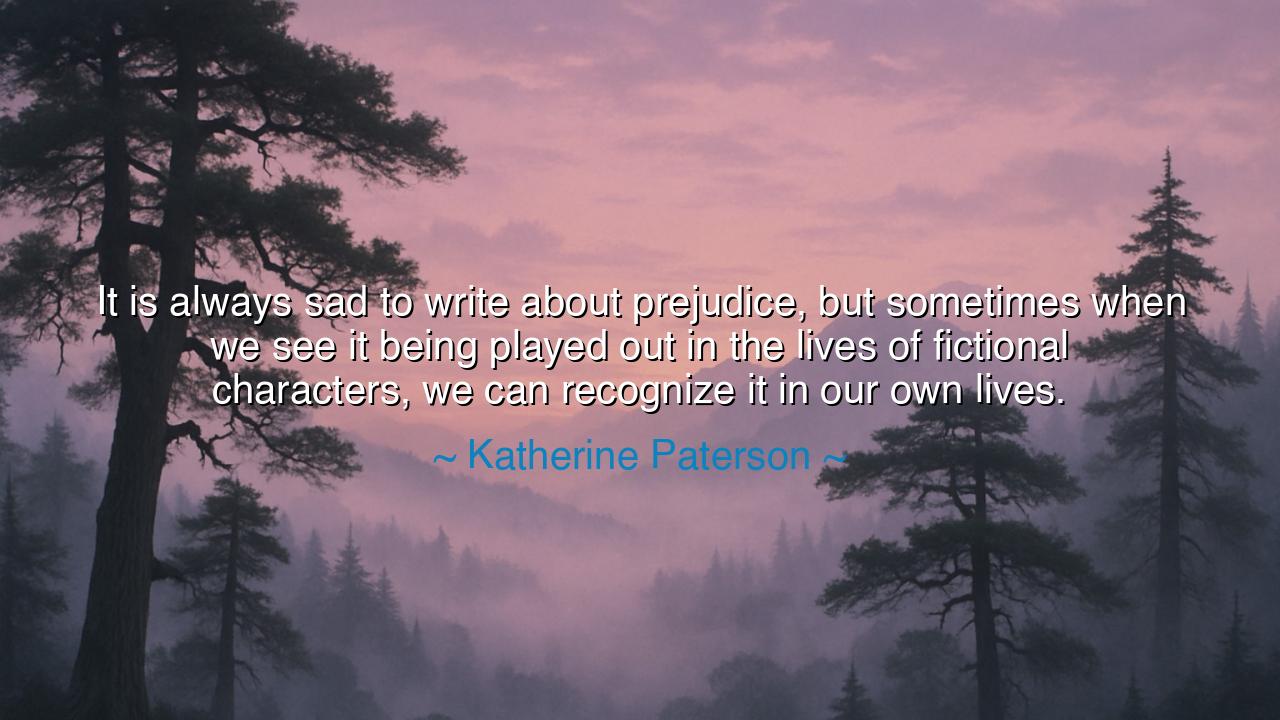
It is always sad to write about prejudice, but sometimes when we
It is always sad to write about prejudice, but sometimes when we see it being played out in the lives of fictional characters, we can recognize it in our own lives.






Hear the words of Katherine Paterson, who lifted her voice in sorrow and truth: “It is always sad to write about prejudice, but sometimes when we see it being played out in the lives of fictional characters, we can recognize it in our own lives.” These words are not merely the reflections of an author, but the voice of a seer, reminding us that stories are mirrors. In their glass we see not only invented lives, but our own hidden failings, our own silent burdens, our own unseen cruelties.
To write of prejudice is indeed sad, for it is to recall humanity’s deepest wounds. It is to confront the blindness that divides neighbor from neighbor, to name the hatred that cloaks itself as righteousness, to reveal the injustice that lingers like poison through generations. Yet Paterson tells us that in the shelter of fiction, we may glimpse these truths without turning away. We resist acknowledging our flaws when they stand naked before us, but in the guise of characters, their struggles become our own, and we cannot help but recognize ourselves.
The ancients understood this power of story. The Greek tragedians wrote of kings brought low by hubris, of warriors undone by wrath, of families broken by pride and vengeance. Those tales were not merely about distant figures—they were mirrors for the Athenians who watched them, reminders of the follies and prejudices they carried within their own hearts. In the same way, Paterson’s words remind us that fictional characters bear a sacred task: to reveal what we would rather hide.
Consider the history of Uncle Tom’s Cabin, Harriet Beecher Stowe’s tale of slavery in America. It was not a political treatise that awakened conscience, but a story. Readers who once turned away from the cries of the enslaved could not ignore the pain of Stowe’s characters. Through their imagined lives, the reality of prejudice and injustice pierced the hearts of millions. Fiction gave flesh to suffering, and in doing so, stirred the beginnings of change.
And yet, the task of the storyteller is heavy, for to write of prejudice is to walk among sorrows. It is to take in the bitterness of division, the cruelty of hate, and to transform it into words that cut yet heal. This is why Paterson names it sad—for in telling such stories, the writer carries not only their own grief, but the grief of generations. But it is a noble sadness, a sorrow that teaches, a burden that becomes light when it opens the eyes of others.
The lesson is this: do not turn away from stories that trouble you, for they may be the very mirrors you need. When you read of a character treated with disdain, ask yourself if you too have looked upon another with silent prejudice. When you see injustice in the tale of another, ask whether injustice lingers in your own life, hidden yet alive. Stories are not only for delight; they are also for correction, for awakening, for the shaping of a more just soul.
Therefore, let all who hear take this counsel: seek stories that challenge as well as comfort. Read the words of those who suffered, and listen to the voices of those long silenced. When you write, do not fear to write of prejudice; though it is sad, it may become the spark that awakens compassion in another. And when you recognize yourself in a fictional character, do not turn away in shame, but rise with courage to change.
Thus, the teaching endures: the sadness of writing about prejudice is transformed into the hope of overcoming it. Fiction, though imagined, carries truth more piercing than fact, for it speaks to the heart as well as the mind. Let us honor this wisdom, and let us be brave enough to see ourselves in the stories of others, so that we may live not in blindness, but in compassion, justice, and truth.






AAdministratorAdministrator
Welcome, honored guests. Please leave a comment, we will respond soon